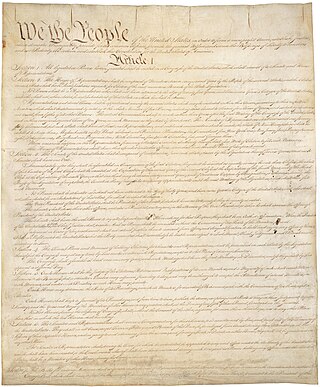In the United States, a state supreme court is the highest court in the state judiciary of a U.S. state. On matters of state law, the judgment of a state supreme court is considered final and binding in both state and federal courts.

The Constitution of the United States is the supreme law of the United States of America. It superseded the Articles of Confederation, the nation's first constitution, in 1789. Originally comprising seven articles, it delineates the national frame and constraints of government. The Constitution's first three articles embody the doctrine of the separation of powers, whereby the federal government is divided into three branches: the legislative, consisting of the bicameral Congress ; the executive, consisting of the president and subordinate officers ; and the judicial, consisting of the Supreme Court and other federal courts. Article IV, Article V, and Article VI embody concepts of federalism, describing the rights and responsibilities of state governments, the states in relationship to the federal government, and the shared process of constitutional amendment. Article VII establishes the procedure subsequently used by the 13 states to ratify it. The Constitution of the United States is the oldest and longest-standing written and codified national constitution in force in the world today.

The Federalist Society for Law and Public Policy Studies (FedSoc) is an American conservative and libertarian legal organization that advocates for a textualist and originalist interpretation of the U.S. Constitution. Headquartered in Washington, D.C., it has chapters at more than 200 law schools and features student, lawyer, and faculty divisions; the lawyers division comprises more than 70,000 practicing attorneys in ninety cities. Through speaking events, lectures, and other activities, it provides a forum for legal experts of opposing views to interact with members of the legal profession, the judiciary, and the legal academy. It is one of the most influential legal organizations in the United States.
Separate but equal was a legal doctrine in United States constitutional law, according to which racial segregation did not necessarily violate the Fourteenth Amendment to the United States Constitution, which nominally guaranteed "equal protection" under the law to all people. Under the doctrine, as long as the facilities provided to each "race" were equal, state and local governments could require that services, facilities, public accommodations, housing, medical care, education, employment, and transportation be segregated by "race", which was already the case throughout the states of the former Confederacy. The phrase was derived from a Louisiana law of 1890, although the law actually used the phrase "equal but separate".

YMCA Youth and Government (YaG), also known as Youth In Government, or Model Legislature and Court, is a program of the YMCA of the USA that allows high school students to serve in model governments at the local, state, national, and international levels.

The Georgetown University Law Center is the law school of Georgetown University, a private research university in Washington, D.C., United States. It was established in 1870 and is the largest law school in the United States by enrollment and the most applied to, receiving more full-time applications than any other law school in the country.

The United States Court of Appeals for the District of Columbia Circuit is one of the thirteen United States Courts of Appeals. It has the smallest geographical jurisdiction of any of the U.S. federal appellate courts, and covers only one district court: the U.S. District Court for the District of Columbia. It meets at the E. Barrett Prettyman United States Courthouse, near Judiciary Square, Washington, D.C.
The Campaign for Fiscal Equity (CFE) was a not-for-profit advocacy organization that sought to protect and promote the constitutional right to a sound basic education for all public school students in the State of New York. Under the leadership of Michael A. Rebell, the organization filed and won the landmark "CFE v. State of New York" lawsuit, which successfully argued that the state's school finance system under-funded New York City public schools and denied its students their constitutional right.

In most legal jurisdictions, a supreme court, also known as a court of last resort, apex court, and highcourt of appeal, is the highest court within the hierarchy of courts. Broadly speaking, the decisions of a supreme court are not subject to further review by any other court. Supreme courts typically function primarily as appellate courts, hearing appeals from decisions of lower trial courts, or from intermediate-level appellate courts.
Griffin v. Illinois, 351 U.S. 12 (1956), was a case in which United States Supreme Court held that a criminal defendant may not be denied the right to appeal by inability to pay for a trial transcript.

The Indiana University Maurer School of Law is located on the campus of Indiana University in Bloomington, Indiana. The school is named after Michael S. "Mickey" Maurer, an Indianapolis businessman and 1967 alumnus who donated $35 million in 2008. From its founding in 1842 until Maurer's donation, the school was known as the Indiana University School of Law – Bloomington.
The Marshall-Brennan Constitutional Literacy Project is civic education program in which law students work with local high schools to enhance understanding of constitutional law and oral advocacy. The project was founded in 1999 at American University's Washington College of Law in Washington, D.C., by Professor Jamie Raskin. There are now nearly 20 chapters in the United States, and there are 2 international chapters. The program began as a way of addressing civic disengagement and a lack of political participation. Through analyzing Supreme Court decisions and participating in moot court arguments, participating high school students learn about their rights as citizens, the strategic benefits of voting, how lawmaking occurs, and other fundamental constitutional processes. They also have the opportunity to compete in a national moot court competition.
The law of Illinois consists of several levels, including constitutional, statutory, and regulatory law, as well as case law and local law. The Illinois Compiled Statutes (ILCS) form the general statutory law.
The law of Washington consists of several levels, including constitutional, statutory, regulatory and case law, as well as local ordinances. The Revised Code of Washington forms the general statutory law.






